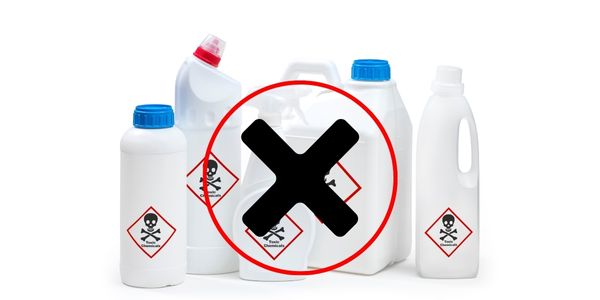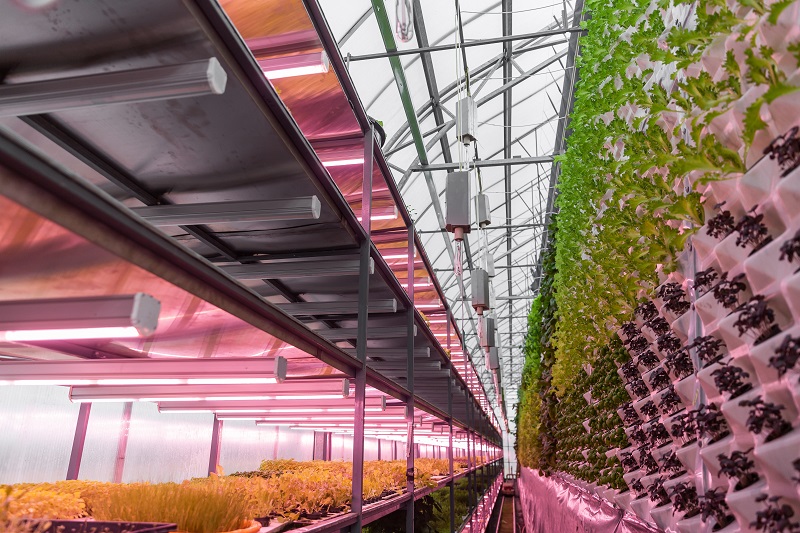Posted: Wednesday, 11 October 2023
The adoption of new technologies is not only beneficial for crop yields but also essential for ensuring that the food we grow is safe and sustainable. One such innovation in the horticultural sector is the use of ultraviolet (UV) light for the disinfection of water supplies and the purification of air in enclosed systems. This technology has numerous benefits, particularly in the context of emerging vertical farming techniques.
Understanding Ultraviolet Light
UV light is a form of electromagnetic radiation with shorter wavelengths than visible light. It is classified into three categories: UV-A, UV-B, and UV-C. UV-C light, with wavelengths between 200 and 280 nanometers. It is particularly effective for use in disinfection systems due to its ability to damage the DNA of microorganisms, rendering them incapable of reproducing. This property of UV-C light makes it a powerful tool for purifying water and also air.
Benefits of UV Light in Horticulture
- Efficient Pathogen Elimination: UV-C light effectively renders bacteria, viruses, and molds harmless, which are common threats to plants in both traditional and vertical farming systems. By installing UV based air handling units and water systems, horticulturists can help reduce the dangers of pathogens, reducing the need for chemical treatments.
- Chemical-Free: The use of UV-C light is a sustainable and eco-friendly approach to pathogen control. It reduces the reliance on chemical pesticides and fungicides, making horticultural practices safer for workers, consumers, and the environment.
- Improved Crop Quality: UV-C light can be used to enhance the overall quality of crops. It can help stop pathogens that may cause blemishes or reduce the shelf life of produce, resulting in higher-quality and longer-lasting fruits and vegetables.
- Energy Efficiency: UV-C systems are energy-efficient and have low operational costs, making them an economically viable choice for both large-scale and small-scale horticultural operations.
- Adaptability to Vertical Farming: The emerging trend of vertical farming is taking agriculture to new heights, quite literally. In vertical farming, space is at a premium, and air and water purity is critical for healthy plant growth. UV technology is well-suited to vertical farms, as it can be integrated into compact systems.
- Reduced Risk of Disease Spread: In enclosed spaces like vertical farms, disease outbreaks can be catastrophic. UV based technology reduces the spread of diseases, ensuring the sustainability and productivity of vertical farming operations.
Widening Adoption of UV-C Technology

UV-C technology is not a new concept in horticulture but has been gaining momentum in recent years. It is being adopted by horticulturists, greenhouse operators, and vertical farmers alike. Some of the prominent applications of UV technology in horticulture include:
- Greenhouse Cultivation: Greenhouse operators use UV-C light to help purify water sources and to disinfect the air that circulates through any enclosed environments.
- Vertical Farming: Vertical farming, a cutting-edge agricultural method, benefits greatly from UV-C technology. As these systems operate indoors, the risk of pathogens spreading is higher, making UV-C an essential tool for maintaining crop health.
- Aquaponics and Hydroponics: Systems that use water-based cultivation methods, such as aquaponics and hydroponics, are integrating UV-C technology into their water filtration systems to ensure water quality and plant health.
- Nursery and Seedling Production: UV-C light is used to sanitize the growing environment for seedlings and young plants, reducing the risk of early disease development.
The use of ultraviolet light to help disinfect or purify in horticultural practices can bring numerous benefits. From reducing the reliance on chemicals to improving crop quality and sustainability, UV technology is helping transform the way we cultivate our crops, particularly in the context of vertical farming techniques. As the horticultural industry continues to evolve to meet the needs of growing populations and demand, UV-C technology is expected to play an important role in ensuring the safety and productivity of agricultural practices.